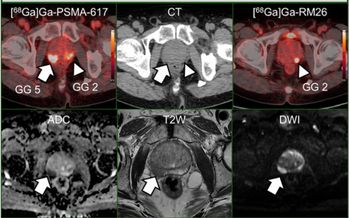
Diffusion-Weighted MRI Guides Stroke Diagnosis
Diffusion-weighted MRI patterns can guide the work-up for patients presenting with acute ischemic stroke symptoms, according to a study in the November Journal of Neurology, Neurosurgery & Psychiatry.
Diffusion-weighted
University of Pennsylvania researchers led by neurologist Monisha Kumar, MD, performed electrocardiogram, non-contrast head CT, brain MRI, head and neck magnetic resonance angiography (MRA), and transoesophageal echocardiography studies with 273 patients. Stroke neurologists determined TOAST (Trial of Org 10172 in Acute Stroke Treatment) classification on admission and on discharge. If the stroke subtype changed between the initial diagnosis and the diagnosis testing, they considered how
The team found that diffusion-weighted MRI patterns appear to predict the cause of stroke better than conventional methods. Further, they say their data suggest an MRI-based diagnostic algorithm can potentially eliminate the need for echocardiography in one-third of stroke patients and may cut back on the need for secondary extracranial vascular imaging studies.
Newsletter
Stay at the forefront of radiology with the Diagnostic Imaging newsletter, delivering the latest news, clinical insights, and imaging advancements for today’s radiologists.














